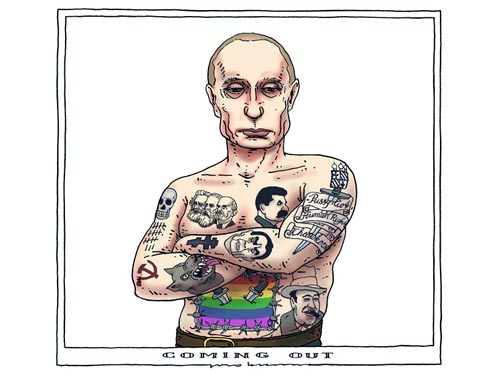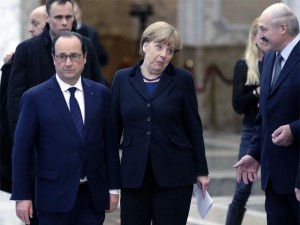Poland and Germany were both initiators and drivers of a New Eastern policy linked to the Eastern neighborhood and Russia/Soviet Union.
Uladzimir Matskevich: The war in Donbas is a question of life and death for Putin

As long as the Putin’s regime has resources, the threat of the World War III remains. The West should introduce real sanctions, help Ukraine modernize its army, and support it with armory.
Ukraine has been living a year now without Yanukovych, who shamefully fled from the country, leaving it to the mercy of fate.
How did Ukraine change during that year? Why hasn’t Ukrainian revolution finished yet? Do the peacemaking efforts of the West stand a chance? How can Putin be stopped?
Uladzimir Matskevich, the head of the Board of the International Consortium “EuroBelarus”, answers the questions of EuroBelarus Information Service.
— Ukraine has now spent a year without Yanukovych. Did the expectations of Maidan justify during this time?
— Maidan was different in different times. It is clear that those Ukrainians, who supported the EU Association, didn’t make significant part of Maidan. People in Kiev protested against corruption, poverty, economic disruption, oligarchs’ rule — against the whole complex of problems that accumulated over the last 20 years. It is impossible to untie a twenty-year tangle of problems within a year even during the peaceful time. However, Ukraine wasn’t even given the opportunity to start improving the situation.
After Yanukovych’s flight Russia immediately annexed Crimea, organized mass provocations at the south-east of Ukraine, which was followed by the start of the large-scale war in Donbas. Ukraine had to spend colossal resources that could have been put in the reforms to war and defense. That is why expectations and demands of Maidan remained unfulfilled; they stay for the future. Only peace will enable the new authorities to start resolving the problems that Maidan set before them.
— Citing the research of the Ukrainian weekly “Mirror of the week”, political commentator Yury Drakohrust concluded that “Ukrainian revolution hasn’t finished yet.” Dissatisfied with the results of the previous Maidan (out of numerous expectations only two were fulfilled: rapprochement with the EU and appearance of new faces among authorities), the moods in favor of third Maidan are strengthening in the society. How big is the possibility of continuation of the Ukrainian revolution?
— Indeed, the revolution hasn’t ended yet; the problems haven’t been solved, Maidan aims haven’t been reached.
But revolution means not only the change of authorities and conduct of reforms that require time. There are some new people among the authorities; however, the structure of power hasn’t cardinally changed in Ukraine. Dismissal of oligarchs from authority might come to be temporary.
The President, the Ukrainian government are in time trouble; they have to adjust their decisions to a number of stakeholders: the EU, the US, the IMF, with other financial and European institutes, as well as with the Ukrainian people, who understood their power at Maidan. Unfortunately, with Russia, too, as until recently Ukraine had strongly depended on Russia, both politically and economically.
Ukrainian people aren’t used to reckon with the authorities and changed them two times already by means of Maidans. The Ukrainian society has no loyalty towards any kind of power. But we need to understand the difficulty of the situation in the country; we need to put ourselves in the shoes of new authorities. I hope that the Ukrainian people will have enough common sense so that not to start a new Maidan before the war is ended and the reforms start.
Among those who criticize the new Ukrainian authorities are a sound part of Ukrainians and are also those who play into Russia’s hands. That is why we should treat the critics of the new authorities with understanding, but also with caution.
— In the situation of war the revolutionary energy of Ukrainians is directed against the external aggressor – Russia and pro-Russian gunmen. There is a version that the Russia-Ukraine war is the result of the real dissolution of the USSR, where Russia, being the hegemon of the post-Soviet area, is trying to avert the factual dissolution of the empire that de jure happened in 1991.
— This is quite obvious. Today’s events in Ukraine is a distant consequence of the Soviet Union’s dissolution and the presence of revanchist forces that don’t aim to restore the USSR, but rather aim to get back the status of the Russian “great empire” that emerged at the USSR’s wreckage and finds itself an heir to the USSR.
In this meaning Ukraine is not the only source of tension at the post-Soviet area; Russia’s actions in Ukraine are typological. Russia acted according to the same scenario in Moldova to create a puppet state Transdniestria; in 2008 Russia launched a war against Georgia and annexed Abkhazia and South Ossetia. Russia is hardly similar to the USSR; its succession is traced on the line of the intelligence services and partially on the line of army. Apart from being the consequence of the communist regime and the communist ideology, “the empire of evil” is also Russia’s specific peculiarity. We can trace common strategies between the Russian empire before 1918, Stalin’s USSR, and Putin’s regime.
— Despite economic and diplomatic losses, Russia-Ukraine war is happening from Russia’s dictation: the gunmen are getting more and more control over the Ukrainian territories. However, the war has already got behind the frames of the local conflict: the EU has been trying to find a peaceful solution to this situation fro almost a year now. What are the prospects of the peacemaking efforts?
— For a long time the world thought that Russia-Ukraine war hasn’t had a military solution. After the disruption of September and February peaceful agreements concluded in Minsk it became clear that the conflict could only be solved by means of war. Russia is not going to stop, whereas international agreements mean nothing to it.
Russia’s actions have two sides: restoration of the Russian empire and the situation that the Putin regime found itself in. For two years Putin hasn’t been solving the problems within the country; failure of the military campaign in Donbas would hardly allow Putin’s regime to stay in power, as all the internal problems would come to surface. That is why the escalation is a matter of life and death for Putin.
No agreements and arguments for political settlement of the conflict will be successful. Russia can only be stopped by force: by successful actions of the Ukrainian army and by political and economical pressure exerted by the West. However, the actions of the West are very timid in this situation. With the transference of power from Yeltsin to Putin in 1999 irreversible changes happened with Russia; however, Western politicians are trying to think in categories of Yeltsin Russia that declared a shift towards the civilized world.
— A historian Yury Felshtynski assumes that this summer-autumn we should expect activation of hostilities, that will mark the start of the World War III by blitzkrieg in Belarus. How realistic is this scenario?
— I am always trying to abstain from any prognoses, especially the ones with specific dates and concrete direction of an attack. Russia is continuing its aggressive politics in relation to all post-Soviet countries, but it is very hard to predict where its next attack will fall. Russia has long ago been nurturing its aggressive plans in relation to the post-Soviet countries; however, these were the plans for the middle-term perspective. Maidan in Ukraine made Moscow quicken the realization of quite raw plans. The situation inside post-Soviet countries will play big role when new aim will be chosen.
I think that Russia is nurturing plans re each post-Soviet country. However, it is hard to predict which plan will Moscow realize.
Lukashenko’s behavior is directed at averting Russia’s absorption of Belarus. How successful will the efforts of the Belarusan regime be is hard to predict. Economic situation within the country and political actions might both provoke Russian aggression and avert it.
The world has long ago realized the threat of the World War III. Now the world becomes all the more prepared to such turn and is preparing its response.
As long as Putin’s regime has resources the threat of the World War III remains. Putin can be stopped by the introduction of real sanctions, by the help provided to Ukraine for modernization of its army, and by help with armory, so that Ukraine would be able to oppose Russian aggression.
— World War III can be averted if Europe will provide such help that would enable Ukraine to oppose Russia aggression, states Felshtynski. Obviously, we are talking about the help with armory, which Europe is afraid to provide to Kiev due to the threat of being drawn in the war. But Europe is already drawn in the war, whether it wants it or not. Is Europe ready to nip the flame of a huge war in the bud or should the flame involve the neighboring countries in order to make Europe undertake more radical actions?
— As the recent events demonstrated, Europe is not ready to change its attitude towards Russia. Russia’s exclusion from the G8 and from the other international institutes is a symbolic action, the consequences of which Russia hasn’t felt yet.
The modern world has enough resources and opportunities to avert the huge war. The current situation really reminds of the 1930s: Austria’s Anschluss, Czechoslovakia’s partition, rebuff that small Finland gave to the Red Army. Ukraine is now in approximately the same situation.
But at the same time the world understands that it is important not to make any mistakes as it happened in Munich. The desire to avoid irretrievable mistakes is only complicating the solution to the problem.
Even if we manage to avert the World War III, Russia’s problem won’t disappear anywhere. When commencing the formation of the new safety system the world community should take into account that not only Russia is going to restore the status of the great empire, but other states might want to acquire the state of the “great empire”, too: China, India, Syria, Saudi Arabia… The world community should provide for such scenarios and elaborate mechanisms for averting such scenarios. It means that the price for non-compliance with the international obligations should become considerably bigger.
Others
-
Uladzimir Matskevich: The sooner the "Union State" is denounced, the better for Belarus
Not only does the “Union State” undermine the establishment of civilized relations with Europe, but it hinders the possibility of normal relations between Belarus and Russia.
-
Uladzimir Matskevich: The regime can no longer control the situation in the country
The authorities are unable to prolong the social contract with the people: there is no way out of the social crisis.
-
Press release of the BNP in connection with the next round of the dialogue in the format of the EU-Belarus Coordination Group
Belarusan National Platform of the Eastern Partnership Civil Society Forum welcomes the dialogue process in the format of the EU-Belarus Coordination Group, the third round of which was held in Minsk on 3-4 April 2017.
-
Hennadiy Maksak: Europe must react adequately to the events in Minsk
A new wave of political repressions should make the EU return to tougher policy towards the Belarusan regime.








Comments
From farewell to a new Eastern policy and towards a new development
Poland and Germany were both initiators and drivers of a New Eastern policy linked to the Eastern neighborhood and Russia/Soviet Union.